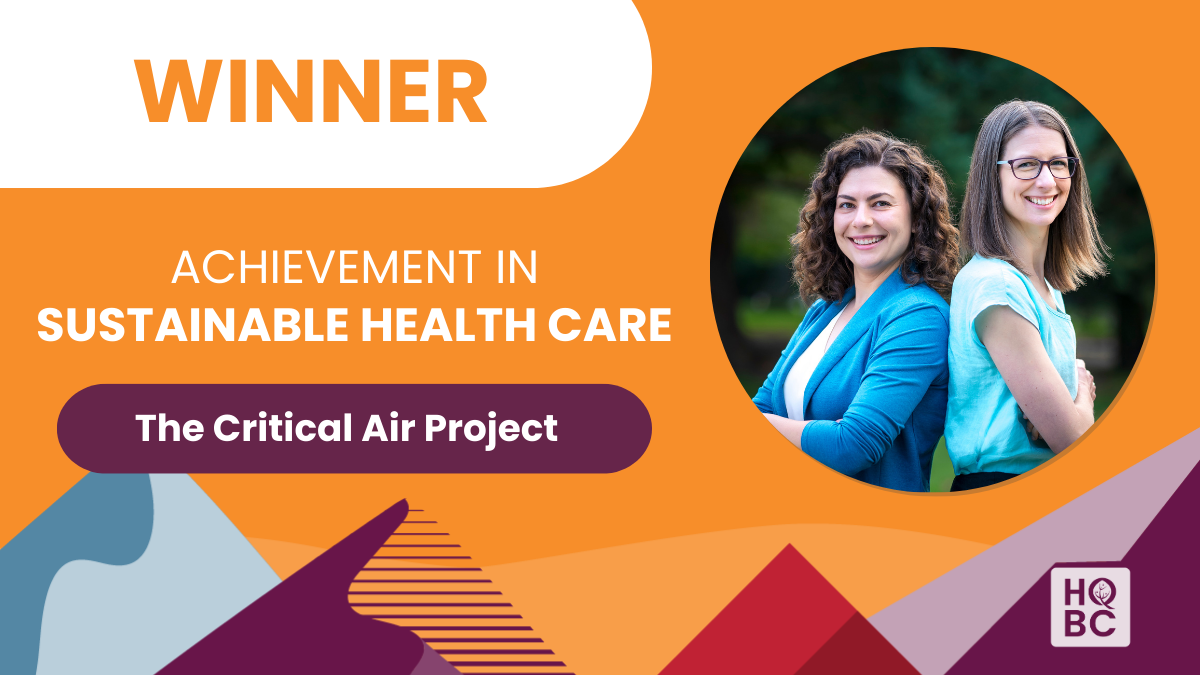- 2025
|
- Winner
|
- Achievement in Sustainable Health Care
Climate change is one of the greatest threats to human health in the 21st century. Yet, the health care we provide itself can be very carbon intensive; 4.6% of our national greenhouse gas emissions (GHGe) stem from the health care sector, a quarter of which are related directly to pharmaceuticals. Among medications, inhalers have been singled out due to their outsized environmental impact. The most used inhaler type, metered-dose inhalers (MDIs), contain hydrofluoroalkane, a greenhouse gas propellant that ejects the medication from the device. Depending on the type and volume of propellant, each MDI can have the carbon footprint of driving up to 170km in a typical Canadian gas-powered car. At a systemic level, 3.5% of a national health care system’s carbon footprint is related exclusively to MDI use.
Over the last 3 years, Valeria Stoynova (MD) and Celia Culley (PharmD) have revolutionized climate-conscious medication management through transformational leadership and capacity building to create innovative pathways for GHGe reductions. The Critical Air Project positively impacts several dimensions of quality including safety, effectiveness, patient-centredness, efficiency and equity.
Culley and Stoynova created The Critical Air Project with the vision triple aim to make a meaningful, measurable impact on health care related GHGe, while maintaining high quality inpatient patient care, and decreasing health care costs by tackling inhaler-related carbon footprint through an evidence-based, patient-centered quality improvement approach that focuses on the following three prongs:
Policy changes
- Advocating for updates to hospital formulary to include low carbon inhaler alternatives.
- Advocating for provincial purchasing contracts to include environmental impact as part of the decision-making process for salbutamol MDIs.
- Initiating the development of policies and procedures to safely send patients home with already dispensed multidose medications (such as inhalers) at discharge.
- Advocacy to change provincial guidelines to include a planetary health lens to respiratory disease care.
Operational changes
- Optimization of the inhaler tamper seal location to reduce waste of unused inhalers.
- Optimization of inhalers available as ward stock to reduce duplicate dispensing.
- Redesign of clinical order sets to promote carbon stewardship when ordering inhalers.
- Optimization of inhaler transfer process to avoid loss.
Educational Campaign
- Developed two playbooks to help educate health professionals, spread and scale the impact of our work.
- Presented multiple conference and Grand Rounds presentations and more intimate physician, pharmacy, and nursing presentations and seminars.
- Developed posters, handouts, and recorded multidisciplinary resources (targeting nurses, respiratory therapy, pharmacists, pharmacy technicians, medical trainees).
The groundwork for the Critical Air Project has been laid over the last three years. As such, Drs Culley and Stoynova are still actively involved in the implementation and measurement of change ideas. This innovative way to think about the climate crisis and our impact within it has already led to meaningful change within the health care system.
Ivy Lam, Pharmacy Innovation Lead, CASCADES: Creating a Sustainable Canadian Health System in a Climate Crisis shared that “Drs. Stoynova and Culley’s dedication to patient and planetary health is inspiring. Their Critical Air Project has prompted important educational, operational, and policy interventions to improve the sustainability of inhaler practices at Island Health and serves as a blueprint for health care providers across Canada interested in undertaking similar efforts. CASCADES is honoured to collaborate with them and share their work with a wider audience as they drive positive change toward more environmentally sustainable health systems.”


